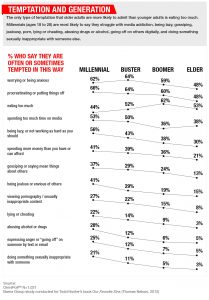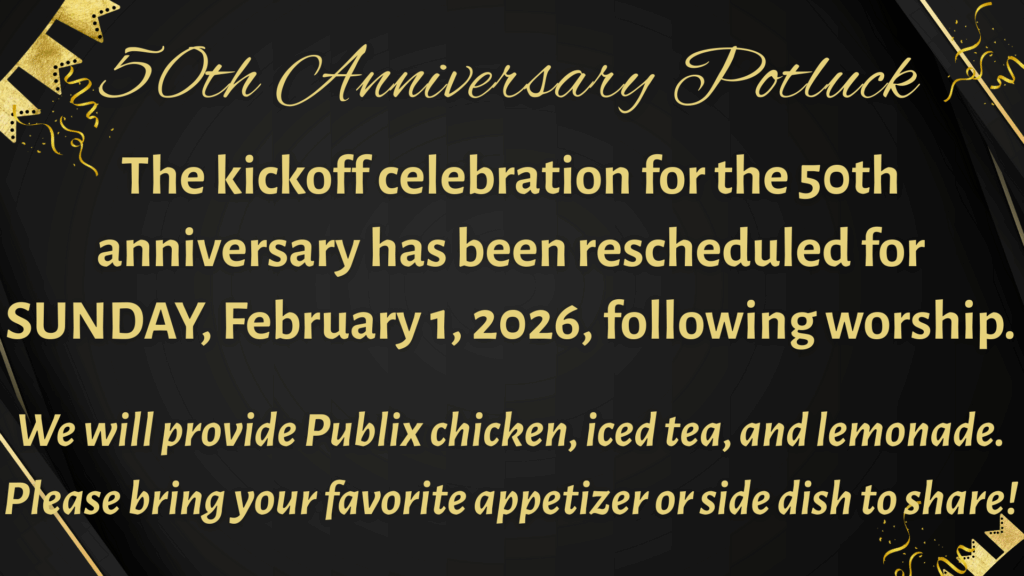I’m a big fan of game shows, especially ones where you can play along. Lately I’ve been enjoying reruns on the Game Show Network of Family Feud and a new show, What America Says. Both are survey-based, where contestants guess what a sample of people have answered to a given question. On this first Sunday of Lent, I want to invite you to play a round with me. The question, given to over 1,000 people, is “What is your greatest temptation?”
[allow time for guesses from congregation]
On Scout Sunday, this might be unfairly biased. How many of you thought about Girl Scout cookies? Six year ago, the Barna group actually did conduct such a survey, with results that I think still hold up today[i].
60% of Americans said they were tempted to worry or be anxious and the same number said procrastination or putting things off was a serious temptation for them. Nearly 55% were tempted to overeat. 44% say they were tempted to spend too much time with media, including the Internet, television, and video games. Relating to the media use, 1 out of 9 Americans said they often or sometimes feel tempted to express anger and “go off” on someone by text or e-mail. These top three temptations, worrying or procrastination, overeating, and overuse of media, in and of themselves are a commentary about our everyday struggles in the 21st century. Next on the list was laziness, followed by more “traditional” temptations of spending too much money (35%), gossiping or saying mean things about others (26%), jealousy (24%). And finally, perhaps underreported, lying, cheating, alcohol, and drugs, all come in at around the same percentage. The study also noted that the more serious a temptation or sin was, the less likely people were to admit to struggling with it. Surprisingly, there was parity between men and women’s answers, although women seemed more likely to admit they were tempted.
Generationally, there were not many differences, either. Older adults were more likely to admit to eating too much, with younger millennials being slightly higher on digital addictions, but on the whole the replies held true across the generations.
By this survey, one could conclude that we are surrounded by temptation; those dangling carrots that easily lead us astray. Pastor and Author Tom Hunter wrote a book in conjunction with this survey titled Our Favorite Sins: The Sins We Commit and How You Can Quit. In it he argues that “all temptations start with a desire for something good: tasty food, rest, intimacy. They become ‘disordered’ when they enslave people and spread pain throughout their lives, [and] disordered desires imprison us. . . in the end, they give us nothing – not one lasting shred of goodness, freedom, joy, or love[ii].” As Christians, we easily make the connection with temptation and sin.
However, David Kinnaman, president of the Barna group, noted that “only 1% of Americans of any age are able to articulate that giving into temptation might be caused by sin. Most Americans think of temptation more as a steady stream of highs and lows that must be navigated[iii].”
Temptations remind us of the very real choices that we have in life. They are a part of our everyday existence, from the big to the small. From a theological perspective, they might reflect the choice between God and God’s way and something else. Theologian D.T. Niles reminds us of the challenge of our predicament, saying:
Both make promises, both demand loyalty. . . If there were no real alternative to God, all [humanity] would choose [God]. Indeed, God is the more difficult choice to justify in terms of provable results[iv].
We would all be good at resisting temptation if it were easy. The trouble is, temptation is enticing. Sin can even be . . . fun. The odds seem stacked against us. We are human beings, prone to sin. Reformer John Calvin even went so far as to call us worms, totally depraved, incapable of not sinning. This cynical approach is both appealing and discouraging, and can let us wonder if we are simply being set up to fail?
The answer, of course, is no. I don’t believe that God sets us up to fail. But I do believe that because God has given us the gift of free will, we, perhaps more often than not, are going to make mistakes and end up in hot water. That’s why stories like Jesus’ temptation in the wilderness are so important. They help give us a sense of what it means to have faith in the midst of the very real, troublesome, surrounded-by-temptation-and-sin lives that we know to be true.
This is how we begin the season of Lent, 40 days of our own wandering in the wilderness, just as the Israelites did for 40 years when they departed from Egypt, and as Jesus did for 40 days immediately following his baptism. As Evelyn Underhill states, “No Christian escapes a taste of the wilderness on the way to the Promised Land[v].” We begin with the reminder of how we are a people in need of forgiveness, with ashes on our foreheads. “Remember you are dust, and to dust you shall return[vi].” It is a season of preparation. While stores are busy preparing the aisles with wicker baskets and plastic eggs, we pause to take time to focus on whatever it is that we need to do to cleanse ourselves and reconcile ourselves to God.
This introspection and examination is a struggle, and more often than not leads us to confront that which tempts us. Hunter speaks frankly about the challenge of beating temptation, and also the reason it’s worth it, saying:
Beating temptation requires a struggle because it always involves sorting out rightly ordered desires for good and godly things from our disordered desires for wrong things. We often experience these disordered desires as our most powerful and deeply rooted desires. Uprooting disordered desires involves personal, psychological, and spiritual suffering. But this death produces life, life, and more life – life more abundant. However, a journey of focused, grace-enabled struggle is required to get there[vii].
Lent is our focused, grace-enabled struggle. Traditionally there are three spiritual disciplines of Lent: prayer, fasting, and the giving of alms. In these, we focus our attentions on developing our relationship with God. Through prayer, we increase our communication, both our talking and our listening, and increase our sense of God’s presence in our lives. Prayer works at any time in any place, even when you aren’t tempted. It perhaps is the single most impactful thing we can do to strengthen our relationship with God. Fasting can mean a number of things, whether it is “giving up” something for the season, or refraining from a certain behavior that leads you into temptation or separates you from God and others. Third, the giving of alms, which can also be seen in service and mission, reminds us of the many others in need around us. It draws us into relationship with others, and gives us a positive way to respond to the world.
In all of these things, though, we must be careful not to get too caught up in the “us” part of the Lenten disciplines. It’s not about how many things we can give up, how many things we can add to our spiritual practices, how many times we showed up for the Mobile Food Pantry and how good that made us feel. If we make our Lenten practices about ourselves, we’ve missed the point, and succumbed to the great temptation of egocentrism. Lent is not about us. Lent is about drawing closer to God. And we can do this even when we are tempted.
We worship a God who has gone into temptation before us, who has himself been exhausted, famished, and caught in vulnerable and weak moments. Some of you may remember the scene from the film The Last Temptation of Christ. It is dry, disorienting, and a little scary. The time in the wilderness is fraught with danger of every kind: physical, emotional, and spiritual. The devil appears, bent on coercing Jesus into activity that surely would be a departure from the path of God. And his offers are pretty good, attempting to at once force Jesus to prove his divinity, while appealing to his humanity, driven by the base desires we all have in life. And each time, Jesus demonstrates a resistance to choosing the easy path, often relying on Scripture and his understanding of God to do so.
In this, he gives us a model of what it means to have faith in the midst of temptation. Jesus chooses to turn to God and trust that God would get him through it. Defeating temptation, then:
is not a struggle against God,” wrestling with ideals we can’t possibly achieve, “but a struggle with God against [our] disordered desires, [our] default position of radical selfishness. God is with [us] in this struggle because [God] wants my transformation more than [we] want it. [We] simply cooperate with him. Together, we reorder [our] desires[viii].
Having faith doesn’t guarantee that we will never be tempted, and it certainly doesn’t guarantee that we will never sin. Faith does, however, assure us that God is always by our side, longing to be in relationship with us, loving us in spite of ourselves, and is ever ready to share with us a grace beyond compare. When we are tempted, it is that grace that pulls us through. And if we give into temptation, it is that grace that will be there for us to get us back on track. May we, in this Lenten season, have faith in that promise, even when we are tempted. Amen.
~sermon by Rev. Elizabeth Lovell Milford, Heritage Presbyterian Church, March 10, 2019
___________________________________________________________________________________________
[i] The Barna Group, “New Research Explores the Changing Shape of Temptation.”
http://www.barna.org/culture-articles/597-new-years-resolutions-temptations-and-americas-favorite-sins, published January 4, 2013. Accessed 3/5/2019.
[ii] John Blake, “Americans Reveal their 3 Favorite Sins,” CNN Belief blog, http://religion.blogs.cnn.com/2013/02/08/americans-reveal-their-3-favorite-sins/, published 2/8/13, accessed 3/5/2019.
[iii] Blake.
[iv] D.T. Niles in The Bible Through Asian Eyes, in Imaging the Word: An Arts and Lectionary Resource, Volume 1, Kenneth T. Lawrence, Editor. (Cleveland, Ohio: United Church Press, 1994), 150.
[v] Evelyn Underhill, The Fruits of the Spirit, in Imaging the Word: An Arts and Lectionary Resource, Volume 1, Kenneth T. Lawrence, Editor. (Cleveland, Ohio: United Church Press, 1994), 151.
[vi] Genesis 3:19
[vii] Tom Hunter, Our Favorite Sins: The Sins We Commit and How You Can Quit. (Nashville, TN: Thomas Nelson, 2012), 3-4.
[viii] Hunter, 5.




Leave a Reply
You must be logged in to post a comment.